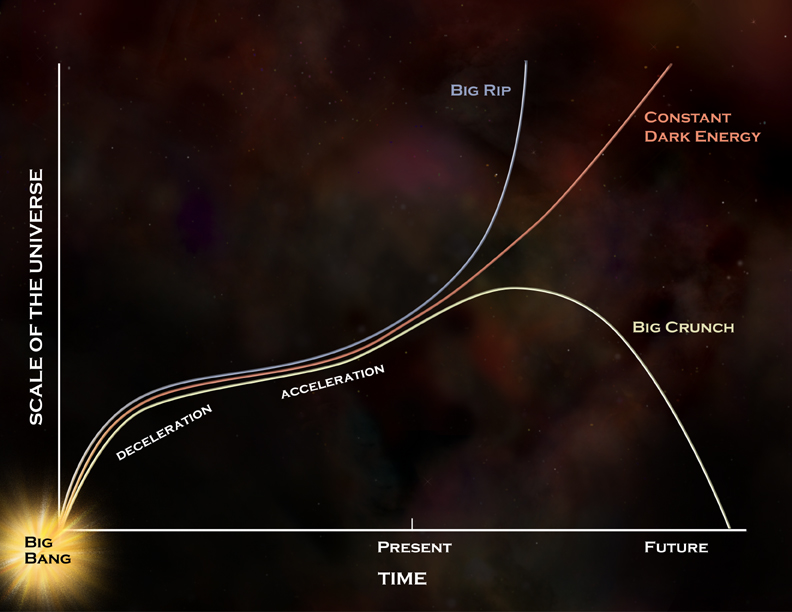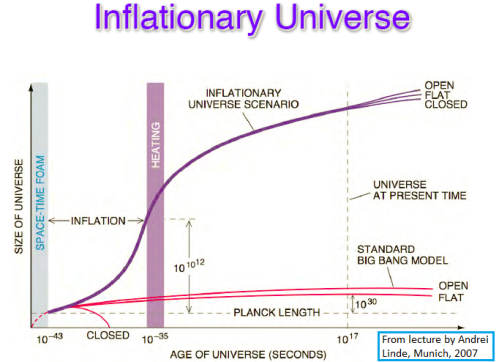Cosmology begins with Einstein's equations of General Relativity (GR for short), and asks whether these equations, applied to the universe as a whole, are capable of explaining what we see when we look out into deep space. GR relates the curvature of spacetime to the energy content in the universe, so in order to solve the equations we need to know what the universe is filled with. There are three basic types of energy we need to consider:
- Matter in the form of galaxies, dust, dark matter, and the like,
- Radiation, including particles moving so fast that they are relativistic, and
- Cosmological constant, aka "dark energy."

This plot shows the "scale factor" - roughly speaking, the size of some patch of the universe, as a function of time.The universe described by this model fits extremely well with the observations of distant galaxies, supernovas, quasars, etc.
If the early universe is indeed radiation dominated, then the scale factor goes to zero at some finite time in the past: that is, there is a Big Bang - an initial singularity.
However, we now have an alternative account of the earliest moments of the universe. Inflationary cosmology, proposed by Alan Guth in 1980, then in a corrected from by Linde and (independently) by Albrecht and Steinhardt in 1982 supposes that before the radiation-dominated epoch there was another epoch, dominated by a cosmological constant - but a very much larger cosmological constant than the one we measure now. I'm not going to go into the reasons these physicists thought there might have been a very large cosmological constant in the early universe, which then "switched off" (meaning it wasn't really a "constant", obviously): you can read about it at the Wikipedia page if you're interested.
The inflationary model was able to explain several features of the universe that had been puzzling in earlier cosmological models: the flatness problem, the horizon problem, and the monopole problem. In science, though, explanatory power is not enough for a theory to become accepted. In addition, a theory has to make novel predictions that are confirmed by experiment before scientists accept it as (likely to be) true.
(I can't help pointing out how different this is from theistic "explanations," in which God is claimed to be the explanation of things like life, morality, or the universe, but where there is no concern for making testable predictions about these realms.)
We now have several good reasons to think that there was in fact such an inflationary epoch. One of these is the pattern of fluctuations of the cosmic microwave background, that fits extremely well with the predictions of inflation:

Another is the very recent BICEP2 result, that seems to show the effects of quantum gravity on the polarization of the cosmic microwave background, in a way consistent with the predictions of the inflationary model.
So inflationary cosmology replaces the initial singularity with a period of exponential expansion.

How long is this inflationary period? Well, an exponential function never reaches zero, so the inflationary period is, in principle, infinitely long!
Let's sum that up: According to our best, experimentally verified model of cosmology, the universe is infinitely old and has no initial singularity!
This is the current state of our understanding of the early universe. Now, I have to admit right away that no physicist thinks the inflationary model is the end of the story. The exponential expansion is so fast that in a very short time the scale factor reaches the Planck realm, where we expect GR to break down and quantum gravity to come into play. So most diagrams of the early universe insert a quantum gravity region before the inflationary epoch. (In this diagram from Andrei Linde it's labeled "Space Time Foam.")

There has been much discussion of what went on before the inflationary epoch: quantum foam, the no-boundary proposal, the cyclic universe, and so on. There is even a version called "eternal inflation," in which some portion of the universe goes on inflating forever, while pocket universes like ours bubble off from time to time. In some of these models, time is finite in the past. In others, it is infinite. But all of them are pure speculation: there is to date no experimental confirmation of any of these scenarios.
Does modern cosmology support the premise that the universe had a beginning? Emphatically, no! Our best model extends infinitely into the past, with no initial singularity. We know better than to take that prediction as the last word: likewise, we know better than to take models that do exhibit an initial singularity as the last word. In short, modern cosmology allows us to draw no conclusion about whether the universe has existed for a finite or infinite amount of time. And anyone who says differently is not being completely honest.
Next time: Why the BVG theorem is irrelevant to the Kalam Cosmological Argument!
Thanks for a very interesting post.
ReplyDeleteThe one thing I'm hesitant over is your epistemology. You claim that a theory has to make novel predictions that pan out experimentally to be accepted as truth. While I agree this is the main road to scientific acceptance, I do think explanatory virtues such as explanatory power and bredth count too. So while I wouldn't at all accept the inflationary model as The Truth without the empirical evidence, I would accept it as being More Likely to Be True in light of its explanatory power.
Yair
Yes, I agree. I didn't mean to imply that explanatory power doesn't count: only that explanatory power, without predictive success, is not sufficient for a theory to become accepted.
ReplyDelete